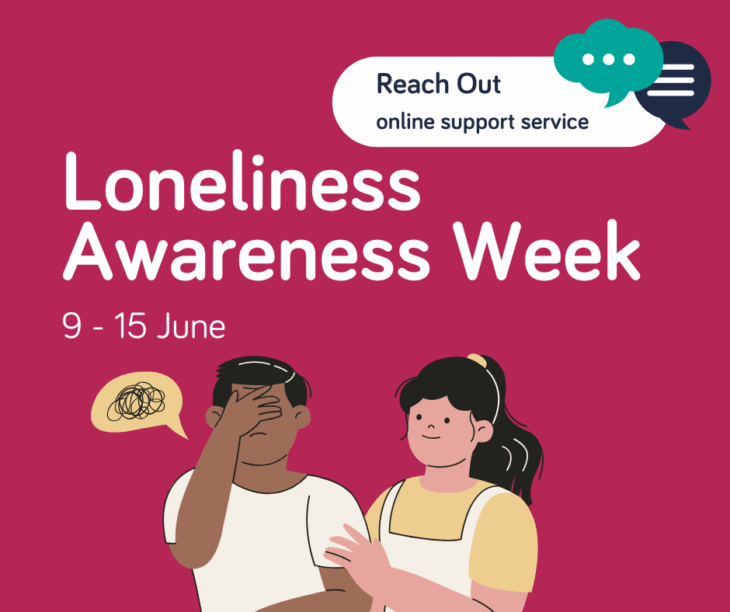Meeting Loneliness Together: Breaking the Silence, Finding Connection

It’s easy to assume that being alone and feeling lonely are the same. Whilst they can influence each other, they are not one and the same. You can be physically on your own yet feel deeply connected to others and emotionally fulfilled. On the other hand, you can be surrounded by people and still feel profoundly disconnected, as if you’re isolated in a far-off wilderness.
This year’s theme, “Meeting Loneliness Together”, is all about reducing the stigma around loneliness, which can often stop people from seeking support. Many feel ashamed or afraid to admit they’re lonely, which only deepens the sense of isolation and allows the cycle to continue.
We hope to gently remind everyone that feeling lonely is completely normal and incredibly common. Most of us experience it at some point, and by encouraging people to open up to loved ones or to feel more confident in accessing services like Reach Out, we hope to create safe spaces where no one feels they have to suffer in silence.
Addiction and loneliness are often deeply intertwined, creating a cycle that can be hard to break. Feelings of shame and fear of judgment can cause individuals struggling with addiction to withdraw, leading to increased isolation and a loss of connection with their social networks. At the same time, loneliness itself can drive people toward substance use as a way of seeking comfort or connection, unintentionally setting the stage for addiction.
If you know someone who may be facing struggles with addiction, simply reaching out can make a meaningful difference. Starting a gentle, non-judgmental conversation and offering your presence in a supportive and reassuring way can help them feel seen and heard. Just being there and listening can be a powerful first step toward helping someone open up and feel understood.
Feelings like shame and fear of judgment can act as barriers, holding us back from opening up to loved ones or seeking help through services like Reach Out. Sadly, despite how widespread loneliness is, the social stigma around it persists. But the truth is, many people have felt or currently feel lonely.
In fact, in 2023, 85% of UK adults had experienced loneliness in the last 12 months with almost half (44%) stating they felt chronically lonely.
You’re far from alone, and breaking the silence around loneliness helps all of us feel a little less isolated and a lot more connected. Although loneliness can feel overwhelming and outside our control, we can take small steps to help alleviate and improve these feelings.
Acknowledgement: Don’t be too hard on yourself for feeling lonely, it’s a natural and very human emotion. As social beings, we’re biologically wired to seek connection, so experiencing loneliness from time to time is completely normal. Try to see loneliness as a signal – much like hunger or thirst – that it might be time to seek more meaningful social connection. Recognising these feelings can help us better understand our emotional needs and take steps to care for our wellbeing before loneliness becomes overwhelming.
Identifying Support: Once we’ve acknowledged that we’re feeling lonely, the next step is to identify where we might turn for support. Are there loved ones you can talk to? Could a support service like Reach Out be a helpful starting point? And if loneliness has been weighing on your mental health for some time, speaking to your GP could also be a really valuable step. No matter who you choose to reach out to, the most important thing is to start the conversation. Loneliness isn’t always visible. People around you might have no idea you’re feeling this way unless you tell them. But once you do open up, you’ll often find that others are more willing to listen and support you than you might expect.
Taking Action: One of the most powerful next steps is taking action to create more opportunities for connection. In today’s increasingly digital world, it’s all too easy to go through our days with little to no meaningful social interaction. Maybe you don’t have much contact with coworkers, or you live far from family and friends and feel isolated in your local area. Whatever the situation, consider small, simple ways to bring more connection into your daily life. It might be as easy as saying hello to neighbours, talking on the phone with loved ones, or opting for a staff-assisted checkout at the supermarket instead of the self-service option. These everyday moments of interaction can help us feel more grounded and connected to the communities around us. For more ideas on ways you can take action, see here.
One immediate way you could take action is by getting in touch with us here at Reach Out. Sometimes, just having someone to talk to can make all the difference. Our friendly, compassionate volunteers are here to listen without judgment. They’ll take the time to understand how you’re feeling and, if you’re open to it, gently guide you toward helpful resources and additional support. Reach Out is open Monday-Friday from 9am to 5pm (excl. bank holidays and weekends).